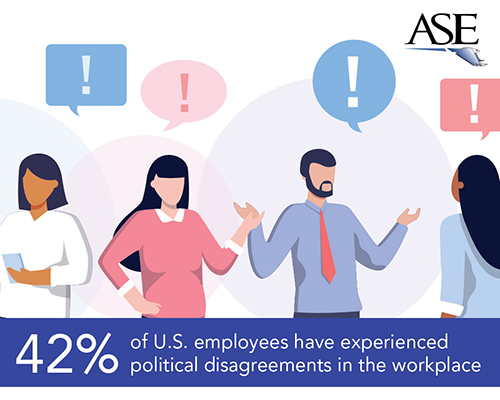
By Heather Nezich, courtesy of SBAM Approved Partner ASE
Although conventional business wisdom has held that employees should check their political opinions at the door while at work, with the heated presidential election less than a year away that isn’t always the case. A new SHRM survey shows that not only are political conversations occurring at work, they’re on the rise—and causing conflicts.
Key findings include:
-
42% of U.S. employees have personally experienced political disagreements in the workplace.
-
A majority (56%) say politics, and the discussion of political issues, has become more common in the past four years.
-
More than one-third (34%) say their workplace is not inclusive of differing political perspectives.
-
12% have personally experienced political affiliation bias.
“One year out from the 2020 election, we should expect to see political disagreements increase even further in the coming months” said SHRM President and CEO Johnny C. Taylor, Jr., SHRM-SCP. “Companies can’t, and shouldn’t try to, quash these conversations because—contrary to popular belief—they’re already happening. But what they can do is create inclusive cultures of civility where difference isn’t a disruption.”
Some tips to create a culture of civility and respect in your workplace:
Be an active listener. Focus on the person speaking to you and listen without interrupting. Use brief, positive responses to keep conversations going and to show you are listening. Ask clarifying questions and summarize responses back to check your understanding.
Create an inclusive environment. An inclusive work environment is one in which all employees can make use of their particular skills, talents, and experiences, and where ideas and contributions are valued. Ultimately, the goal of an inclusive workplace is creating a team where people from all backgrounds are encouraged to share their unique talents.
Acknowledge people. Don’t assume people know you appreciate them or respect their contributions. Go out of your way to acknowledge people. From small gestures like a thank you note to things like recognition in a meeting or an annual award, acknowledgment is important.
Remember that actions can speak louder than words. Delegating important tasks, being open to contributions and feedback, and letting employees pursue creative ideas can show them that you trust and respect them. Actively support your employees by not micromanaging and trusting them to complete tasks and projects.
Set a good example. As a leader, you can spread civility. You’d be surprised how much your example can influence others. In addition to focusing on positive behaviors, make sure to avoid the tendency to engage in gossip or other forms of negative communication.
Provide civility training. Don’t assume people naturally know how to be civil and respectful. Even well-intentioned people may not have the skills or have had models of civility in their lives. Training employees by being explicit about the importance of civility, providing examples of civil and uncivil behavior, and giving opportunities to practice using real-world scenarios is important.